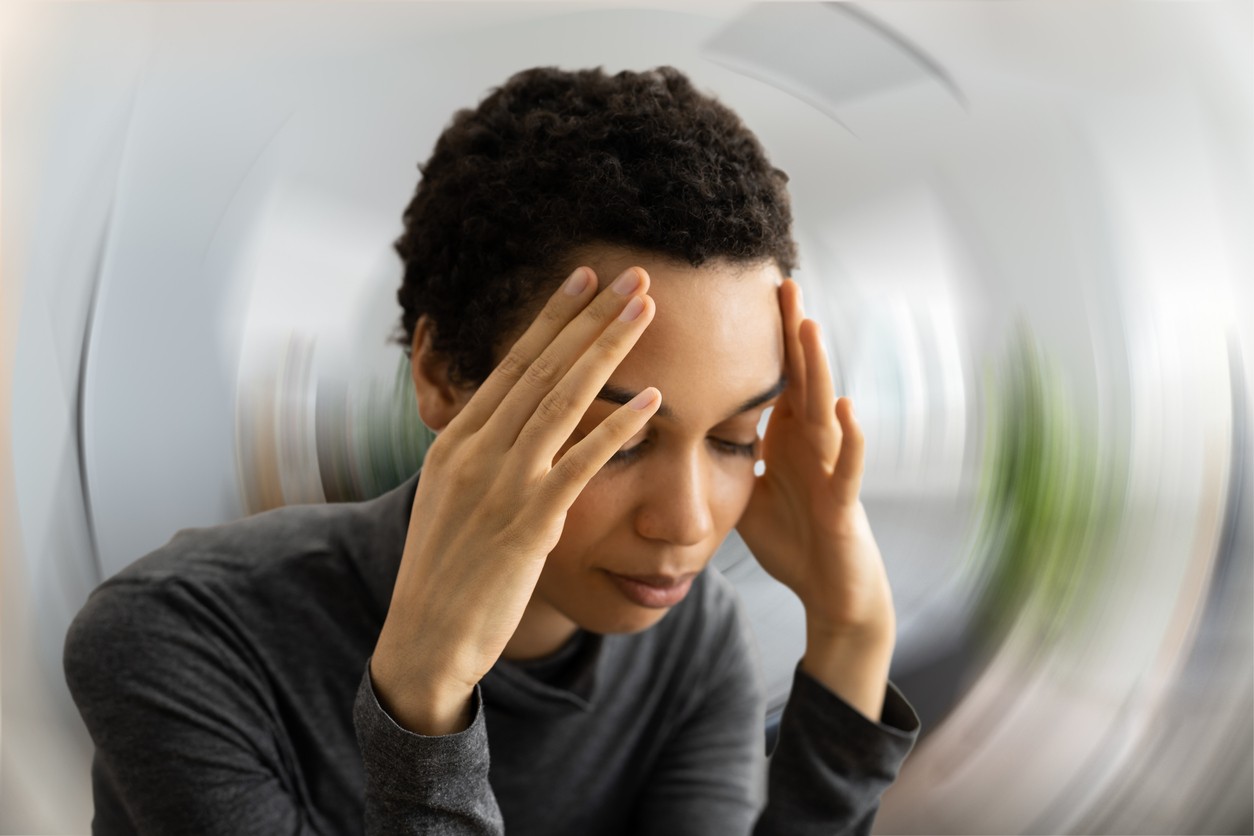Can a Chiropractor Help with Vertigo?
There are few feelings quite as unsettling as a dizzy spell. If you get them frequently or for long periods, the sensation of the world spinning in circles can leave you anxious about when the next episode will occur. Nearly 40% of Americans will experience at least one vertigo attack throughout their life. If you’re one of them, it’s important to know how to handle it when the time comes.
Finding long-lasting, effective treatment for your vertigo is a crucial part of living a comfortable, stress-free life. At Total Body, we know that chiropractic care can be part of the solution. Continue reading to learn about the different forms of vertigo and your treatment options, including chiropractic adjustment.
What is Vertigo?

Vertigo is the sensation of dizziness or the overall feeling of being unbalanced. This sensation can present itself in a couple of ways: you are spinning in circles, or your surroundings are moving even when you’re standing still. Some people describe vertigo as being similar to motion sickness. However, it is not the same sensation as lightheadedness.
For clarity, vertigo is not a disease. Instead, it is a symptom of a range of conditions. More specifically, this false sense of movement can indicate a problem in the inner ear, brain, or sensory nerve pathway.
Various internal and external stimuli can trigger an attack, from illness to movement. While you cannot prevent the initial onset, it is possible to manage the recurrence of the symptom.
Certain characteristics may increase your likelihood of experiencing symptoms of vertigo:
- Being 65 or older
- Pregnancy
- Frequent ear infections
- Being female
What are the Symptoms of Vertigo?
Your vertigo symptoms may vary by the type of condition you have and the cause of your dizzy spell. Generally, when a vertigo episode hits, you can experience varying common symptoms and sensations:
- Spinning sensation
- Tilting
- Swaying
- Feeling unbalanced
- Like you are being pulled to one direction
Depending on the condition that is causing your vertigo and its severity, you may also experience other non-motion related symptoms of vertigo:
- Nausea
- Vomiting
- Jerking or abnormal eye movements, typically from side to side
- Headache
- Sweating
- Ringing in the ears or hearing loss
These vertigo symptoms can last anywhere from a few seconds or minutes to a couple of hours. Your attacks may also come and go rapidly and randomly.
Different Types of Vertigo and Their Causes

There are several different types of vertigo, and each is connected to a different area of the body. Some carry distinct symptoms that you will want to address to ensure lasting comfort.
1. Peripheral Vertigo
This is the most common form of vertigo. It occurs when there is a malfunction in one or more structures in the inner ear. Typically, peripheral vertigo results from problems with the vestibular system, which is responsible for balance and spatial awareness.
Peripheral vertigo is an umbrella term for a few different forms of this inner ear problem. Your personal experience may fall into one of the following categories:
2. Benign Paroxysmal Positional Vertigo (BPPV)
BPPV is the most common form of peripheral vertigo. It affects one ear at a time, rather than both. However, the symptoms are still felt body wide.
This condition results from calcium crystal deposits, known as otoconia, located in the inner ear canals. In its ideal state, this debris should reside in the utricle and saccule space in the inner ear. However, situations like head trauma, inner ear disease (infectious or inflammatory), prolonged head position (as is the case in bed rest or dentist visits), or age-related deterioration can cause these calcium crystals to make their way to the semicircular ear canals.
When in this area, the crystals stimulate the small hairs that line the inner ear, which leads to short, frequent spells of vertigo symptoms when you move.
3. Meniere’s Disease
While we cannot pinpoint an exact cause of Meniere’s Disease, it is associated with fluid buildup in the inner ear. This condition can come on quickly and last up to 24 hours. During severe attacks, you may also experience nausea, vomiting, hearing loss, and ringing or fullness in the ears.
Dietary changes that influence body fluids can help manage symptoms of Meniere’s Disease. Your doctor may suggest limiting salt, sugar, caffeine, and alcohol. They may also prescribe a diuretic pill to regulate your fluid levels.
4. Vestibular Neuritis or Labyrinthitis
Vestibular neuritis, sometimes referred to as vestibular neuronitis or labyrinthitis, often has a sudden onset. Viral illnesses, such as the cold and flu, or bacterial infections, can be to blame for your condition. In cases of vertigo symptoms, the infection has spread to the vestibular nerve or labyrinth that controls balance and hearing. Outside of dizziness, you may have several other symptoms, including fever, headache, earache, nausea, and vomiting.
5. Otosclerosis
This form of hearing loss involves the middle ear. Abnormal bone growth causes three bones in this area to become stuck together. This action impacts hearing and can result in tinnitus and dizziness.
Antibiotics, blood pressure prescriptions, and pain medications may also lead to peripheral vertigo symptoms, although these may resolve once treatment has ended.
6. Central Vertigo
Central vertigo stems from problems with the central nervous system (CNS), primarily in the brain stem or cerebellum (back of the brain). These conditions may cause central vertigo:
- Blood vessel disease
- Multiple Sclerosis
- Stroke
- Tumors (cancerous or benign)
- Brain Injury
- Migraine
- Drugs, such as anticonvulsants, aspirin, and alcohol
- Seizures, although rare
Central vertigo symptoms can come and go without warning and may last a long time. The sensations feel more intense than peripheral vertigo attacks. You may not be able to focus your eyes or stop the abnormal movements for weeks to months during an episode. Some people find it difficult to walk or even stand without assistance much less continue daily habits.
7. Cervical Vertigo
Cervical vertigo, or cervicogenic dizziness, results from improperly moving joints in the cervical spine. You are more likely to develop this condition after a neck injury. Due to misalignments, your brain and spine cannot communicate properly, leading to misinformation about your body’s position in space. Addressing these misalignments can ease vertigo attacks as well as neck pain in most patients.
What Triggers Vertigo Attacks?

Recurring vertigo attacks are common if you have not addressed your underlying condition. However, certain triggers make it more likely to experience an episode.
Avoid these stimuli to prevent vertigo attacks:
- Bright lights
- Rapid head movements
- Looking up
- Bending over
If vertigo episodes are common, try to stand up slowly and sleep with your head propped up.
Boating and reading while in a moving vehicle are two common triggers of vertigo symptoms, more commonly classified as motion sickness. If you find yourself in these situations, try staring at a stationary object. Having a point of focus can help you maintain a sense of balance.
If you know you’ll be going on a cruise, ask your doctor for a scopolamine patch to prevent nausea and vomiting, common of motion sickness.
Treatment Options for Vertigo
1. Medications
Your doctor may prescribe you a range of medication to treat the cause of your vertigo and ease the accompanying symptoms. For example, if your vertigo symptoms stem from ear infections or other bacterial illness, antibiotics may help resolve your issue. Other common medications include:
- Antihistamines
- Prochlorperazine to relieve nausea
- Benzodiazepines for the physical symptoms of vertigo
- Betahistine for Meniere’s Disease — it can reduce pressure from fluid build-up in the inner ear.
2. Chiropractic Care
Thanks to its neurological connections, chiropractic manipulation and care presents an effective treatment option for many forms of vertigo. Not only can a manual adjustment boost communication between the brain and body, including ears, lymphatic, and immune systems, but it can also promote faster healing in the case of infection.
Chiropractic Treatment for Vertigo
Vertigo treatment also involves the following specific physical therapies that restore full-body balance:
1. Vestibular Rehabilitation
Vestibular rehabilitation is a form of physical therapy that can improve balance and coordination. This exercise-based program helps you work through different points of balance so you can compensate with unsteadiness from Meniere’s Disease.
2. Repositioning
For those with BPPV, the Epley Maneuver, also known as canalith repositioning, and Semont Maneuver provide effective treatment. During your visit, your chiropractor will rotate your head in three to four different positions in one-minute intervals to move debris out of the semicircular canals into the appropriate areas. This treatment takes about 15 minutes and offers an 80% success rate.
3. At-Home Exercises
If the maneuvers are not effective, your chiropractor may give you rigorous at-home Brandt-Daroff exercises. You will complete 3 sets of each exercise several times a day. Generally, 95% of cases resolve successfully with this treatment route. In certain patients, these exercises can cause more dizziness or nausea.
With the help of chiropractic care, symptoms typically improve gradually over weeks and even months in some cases. Regular adjustments can reduce the frequency and recurrence of attacks. Because chiropractic care takes a holistic approach, you may also experience reduced stress, better sleep, and improved posture as a bonus after your visit.
Don’t let vertigo throw your life off balance. The staff at Total Body is equipped to provide well-rounded care to ease the symptoms of vertigo, so choose Total Body as your chiropractic clinic for regular chiropractic care. Call our office today to set up your appointment and restore stillness to your world.

